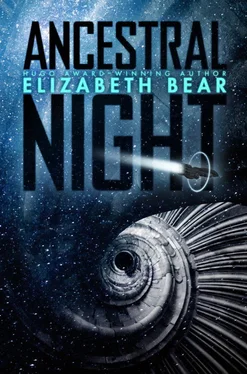Busy pollinators buzzed and fluttered among them, leaving me to wonder how they knew which plants were biologically compatible. Smell. Instinct. Ancestral insect knowledge.
I wondered if the methane and chlorine sections of Downthehatch had similar extravagances, or if their stationmasters had different hobbies.
We paused beside a low, puce-colored plant that had the rough architecture of a mammalian brain and seemed otherwise unprepossessing, but was nevertheless absolutely darting and swarming with bright-winged butterflies. Or butterfly analogues; I didn’t know enough to be able to tell, and couldn’t be arsed to check my senso for the data.
It was busy, anyway.
We turned again, this time back toward the aquaculture area. “And Habren? What’s their deal?”
My new friend paced alongside me on six slender legs, the two deadly looking raptorial manipulators folded against its forethorax, the more delicate ones waving gently in the air. Allow me to encrypt this conversation?
The stationmaster might, in fact, be eavesdropping on our senso. The Goodlaw, in fact, had access to law-enforcement encryption tools.
“Of course.”
It wouldn’t be suspicious at all that Goodlaw Cheeirilaq and I were talking about it over encrypted channels, of course. But the Goodlaw being the law in these parts, and the Synarche Space Guard being out of town currently, I decided to trust its judgment. There was a tickle as Cheeirilaq established a secure socket into my sphere, requesting limited permissions that I readily granted. It wouldn’t prevent a really determined eavesdropper, but it would slow them down a little.
I hoped I would meet you here, it said. I’ve been monitoring your movements, under orders from [Habren], and I noticed your pattern of visits. Since I come here fairly often myself, a chance meeting would seem unremarkable.
Speaking out loud would make the secure connection useless, so I replied silently. You don’t trust Habren.
There was the virtual equivalent of a shrug. [Habren] is no worse than many. This place is in dire need of personnel support. The Republic is involved in its management through extortion, as you have no doubt deduced, and [Habren] does not care for being beholden to pirates. However, obtaining defensive personnel is less than easy. Material resources are less of a problem, obviously, because we have excellent printing support and the local system for materials.
If [Colonel] [Habren] could manage some major coup, they might get more attention and support. That would benefit Habren and also the station, and disbenefit the pirates.
Where do all these plants come from, if resources are so scarce? I asked.
Shipped as seed, often traded with other hobbyists. The soil is manufactured. All the pollinators are local-system. The only real resource expenditure is space, and as you have noticed, the station is not crowded.
Habren’s interest is not why you sought me out, however. I felt alarm that Habren had set the Goodlaw to watch me, and confusion at the Goodlaw’s loyalties. Habren might be worse than Cheeirilaq was admitting. If there was a chance we were being monitored, it wouldn’t exactly want to call out its… well, the stationmaster wasn’t precisely its boss, but somebody in greater authority over the station than it held itself… in a recordable format. And it couldn’t entirely know my loyalties, either.
I recognize your tattoos.
Well, that shifted me from mild alarm to sirens shrieking so badly I had to tune myself down to mere alert arousal just in order to hear the rest of the conversation. I took a deep breath and held it and turned my amygdala down to about three, then let the breath out again.
You can see them? I asked, glancing down at my nanoskin-covered arm.
Ultraviolet reflectivity. A wing-settle that could be an insectoid shrug.
I was looking for information on the syster operating the factory ship, I said. Noncommittal, and something it already knew. There’s nothing in our databases, which might be nothing or might be withheld information. Habren claimed they had no information either, but they might be lying.
That’s because the species operating the factory ship is not a syster.
I actually turned to the giant bug and gaped, dumbstruck. As far as I knew, every intelligent race that the Synarche had encountered had, eventually, been induced to join it. The fact of an enormous, existing trade organization and governmental body that, in general, had overwhelmingly superior technology to any emerging race and also a complete monopoly on exploration and trade generally proved a convincing argument. Once a species developed what Terrans called the Alcubierre-White drive, or one of its variant technologies, the Synarche was waiting to greet them.
Sometimes new systers tried to start a shooting war, which generally had similar results to a kitten attacking your pants leg; when the difference in available force is so overwhelming, and you’re essentially raising a child, there’s literally no need to shoot back. Even races as belligerent as my own had come around eventually.
A few went with isolationist policies for a local generation or two, but eventually somebody started tuning into the propaganda channels and wanting all that great stuff, and within a hundred ans or so—well, the Synarche was also patient. Like a respectful suitor—unlike my friend Rohn in the bar—it had nothing to gain by hurrying things.
Earth could have learned a long time ago that securing initial and ongoing consent, rather than attempting to assert hierarchy, is key to a nonconfrontational relationship. Because we’re basically primates, we had to wait for a bunch of aliens to come teach us. We’d at least, by then, developed the tech to fix our brains so we could accept emotionally what logic should have showed us.
What can I say? We’re slow.
Not a syster? I asked. I mean, there were the Ativahikas, which weren’t exactly a syster, not really talking to the rest of us much. And not having a white space drive so much as being a white space drive… .
Suddenly, all the glittering particles gliding gracefully and harmlessly between the cells of my epidermis seemed to ferociously itch. I’m not a praying sentient, but at that moment, I felt such a horrible black hole of implication implode in my belly that I almost doubled over in pain. Cheeirilaq put a manipulator on my shoulder to steady me.
That’s why you recognize the tattoos , I said.
The particles are derived from the sensory organs of Ativahikas. They are not widely known; in fact, their existence is kept a secret outside of law enforcement circles. They are believed to be a form of Koregoi technology that was given to or traded for or somehow imbued into the Ativahika species in a time of great antiquity. In combination with certain innate abilities of the Ativahikas, they allow the species to—
I interrupted. —to traverse space-time as if they were living starships. And somebody is stealing these particles, by murdering Ativahikas. And I have a bit of this technology embedded in me.
I’m sorry, Cheeirilaq stridulated, reminding me that the rest of the conversation had been carried out in utter silence.
We stopped before the aquaculture observation windows.
I am glad, the Goodlaw continued, that you did not acquiesce to this anathema knowing its origin.
I’m a walking war crime.
Yes.
The dodecapod was hard at work when we paused. It had a combined head and body about a meter across. It didn’t speak to us, seeming involved in its labors, but as we paused it raised six of its twelve legs in a cheery wave, flashing ripples of electric blue and silver across its normally sedate dark red surface. Maybe it recognized us; apparently we were both around enough, and we’d been waiting for clearance to leave for more than two dia. Also, dodecapods and humans have kind of a long-term friendly relationship. I don’t remember all the details, but we found them before they invented spaceflight—spaceflight is a rough invention for aquatic species, for a number of obvious reasons, though they’re great astronauts once somebody gets them up here, and the noncompressibility of water means they’re often really good at remaining functional in erratic gs—and before the Synarche brought us in as systers, but after we’d developed crude rightminding technology.
Читать дальше












